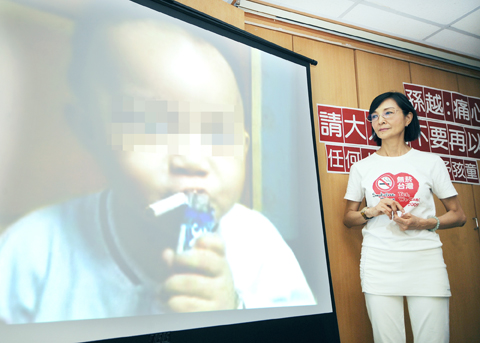Parents who give cigarettes to their children are not only breaking the law, but are also torturing their children and should be heavily penalized, the John Tung Foundation said yesterday.
The foundation also publicized videos in which parents or other adults were seen providing cigarettes to children and babies and laughing as they smoked or coughed after inhaling the smoke.
Photos and videos of young children smoking cigarettes have been posted on the Internet recently.

PHOTO: LIAO CHEN-HUEI, TAIPEI TIMES
Lin Ching-li (林清麗), head of the foundation’s Tobacco Hazard Prevention Section, said that in the past four days, the foundation had received more than 20 complaints concerning videos posted by adults who let children smoke cigarettes.
Many of the videos are posted on Internet video sites and popular blog sites and can be found under categories such as “family entertainment” or “learning and growing,” she said.
The foundation said such parenting behavior was irresponsible and was no different from people who record themselves torturing animals and post the video on Web sites.
Parents who allow or even force their children to smoke cigarettes are damaging their children’s health and skewing their children’s behavior, it said.
The foundation said studies showed that the younger a person starts smoking, the more difficult it will be for that person to quit the habit.
People who start smoking before they are 15 years of age are also eight times more likely to develop lung cancer, the foundation said.
“Parents should realize that they are responsible for their children’s welfare,” Sun Yue (孫越), a celebrity who is now a volunteer at the foundation, said. “Parents should not find entertainment or happiness at the expense of their children’s health.”
The foundation said adults who provide tobacco to children were in violation of the Children and Youth Welfare Act (兒童及少年福利法), an offense punishable by a fine of between NT$10,000 and NT$50,000.

A magnitude 4.9 earthquake struck off Tainan at 11:47am today, the Central Weather Administration (CWA) said. The hypocenter was 32.3km northeast of Tainan City Hall at a depth of 7.3km, CWA data showed. The intensity of the quake, which gauges the actual effect of a seismic event, measured 4 in Tainan and Chiayi County on Taiwan's seven-tier intensity scale, the data showed. The quake had an intensity of 3 in Chiayi City and County, and Yunlin County, while it was measured as 2 in Kaohsiung, Nantou County, Changhua County, Taitung County and offshore Penghu County, the data showed. There were no immediate reports of

‘DENIAL DEFENSE’: The US would increase its military presence with uncrewed ships, and submarines, while boosting defense in the Indo-Pacific, a Pete Hegseth memo said The US is reorienting its military strategy to focus primarily on deterring a potential Chinese invasion of Taiwan, a memo signed by US Secretary of Defense Pete Hegseth showed. The memo also called on Taiwan to increase its defense spending. The document, known as the “Interim National Defense Strategic Guidance,” was distributed this month and detailed the national defense plans of US President Donald Trump’s administration, an article in the Washington Post said on Saturday. It outlines how the US can prepare for a potential war with China and defend itself from threats in the “near abroad,” including Greenland and the Panama

The Chinese Nationalist Party (KMT) is maintaining close ties with Beijing, the Democratic Progressive Party (DPP) said yesterday, hours after a new round of Chinese military drills in the Taiwan Strait began. Political parties in a democracy have a responsibility to be loyal to the nation and defend its sovereignty, DPP spokesman Justin Wu (吳崢) told a news conference in Taipei. His comments came hours after Beijing announced via Chinese state media that the Chinese People’s Liberation Army’s Eastern Theater Command was holding large-scale drills simulating a multi-pronged attack on Taiwan. Contrary to the KMT’s claims that it is staunchly anti-communist, KMT Deputy

RESPONSE: The government would investigate incidents of Taiwanese entertainers in China promoting CCP propaganda online in contravention of the law, the source said Taiwanese entertainers living in China who are found to have contravened cross-strait regulations or collaborated with the Chinese Communist Party (CCP) could be subject to fines, a source said on Sunday. Several Taiwanese entertainers have posted on the social media platform Sina Weibo saying that Taiwan “must be returned” to China, and sharing news articles from Chinese state media. In response, the Mainland Affairs Council (MAC) has asked the Ministry of Culture to investigate whether the entertainers had contravened any laws, and asked for them to be questioned upon their return to Taiwan, an official familiar with the matter said. To curb repeated